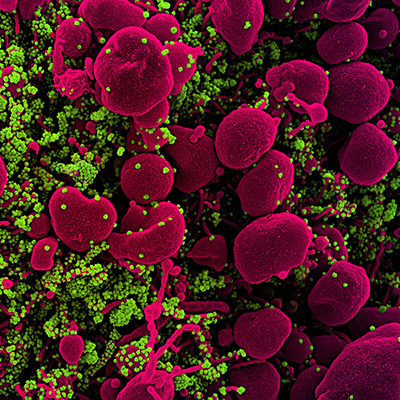June 22, 2020 -- Could live vaccines for viruses such as measles, mumps, and rubella (MMR) also provide protection against COVID-19? That intriguing prospect is the subject of a recently published commentary in mBio.
There is mounting evidence that live attenuated vaccines, such as the MMR vaccine, provide protection against lethal infections unrelated to the pathogen that was originally targeted. The proposed mechanism for this protection is "trained innate immunity," by which leukocyte precursors in the bone marrow are "trained" by the vaccine to function more effectively against broader infectious insults. The protection is mediated by long-lived myeloid-derived suppressor cells (MDSCs), cells that previously have been reported to inhibit septic inflammation and mortality.
Now, induction of MDSCs is thought to inhibit or reduce severe lung inflammation or sepsis associated with severe COVID-19 infection. Researchers from Louisiana State University and Tulane University demonstrated that vaccination with a live attenuated fungal strain induces trained innate protection against lethal polymicrobial sepsis. They also cited six clinical trials in other countries that are testing trained innate immunity with the live attenuated tuberculosis Mycobacterium bovis bacillus Calmette-Guérin (BCG) vaccine. Other childhood vaccines, including those for rotovirus, smallpox, and chickenpox, may work in a similar manner to limit inflammation and sepsis.
"Live attenuated vaccines seemingly have some nonspecific benefits as well as immunity to the target pathogen. A clinical trial with MMR in high-risk populations may provide a low-risk/high-reward preventive measure in saving lives during the COVID-19 pandemic," said Paul Fidel, PhD, department chair of oral and craniofacial biology at Louisiana State University (LSU) and associate dean for research at the LSU Health School of Dentistry.
The "trained innate immunity" hypothesis may explain why children have been less likely to be impacted by COVID-19, since they have more recent and frequent exposures to live attenuated vaccines that may induce trained suppressive MDSCs that limit inflammation and sepsis. It may also explain why only mild symptoms were observed in the 955 sailors on the USS Roosevelt aircraft carrier who tested positive for COVID-19 in April, with only one hospitalization required. As a precautionary measure, MMR vaccinations are given to all U.S. Navy recruits.
"If adults got the MMR as a child they likely still have some level of antibodies against measles, mumps, and rubella, but probably not the myeloid-derived suppressor cells," said Fidel. "While the MDSCs are long-lived, they are not life-long cells. So, a booster MMR would enhance the antibodies to measles, mumps, and rubella and reinitiate the MDSCs."
Given that there are no contraindications to MMR vaccination of immunocompetent individuals, the authors recommended clinical trials with MMR as a low-risk, high-reward preventive measure for high-risk populations such as healthcare workers who can easily be exposed to COVID-19.
Do you have a unique perspective on your research related to virology or vaccine development? Contact the editor today to learn more.
Copyright © 2020 scienceboard.net








